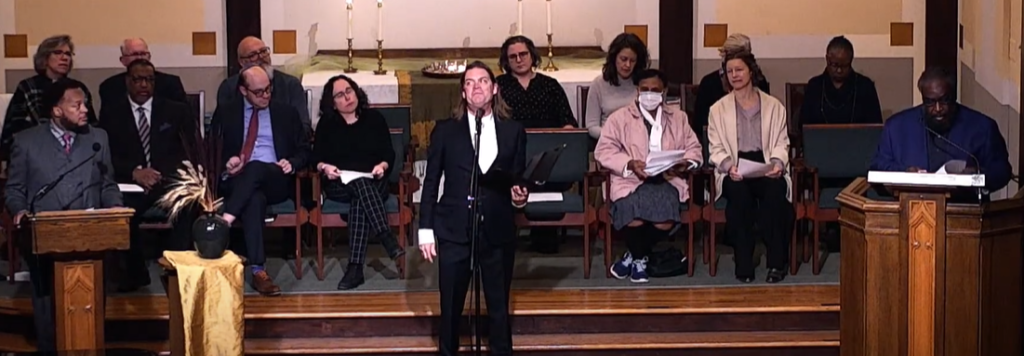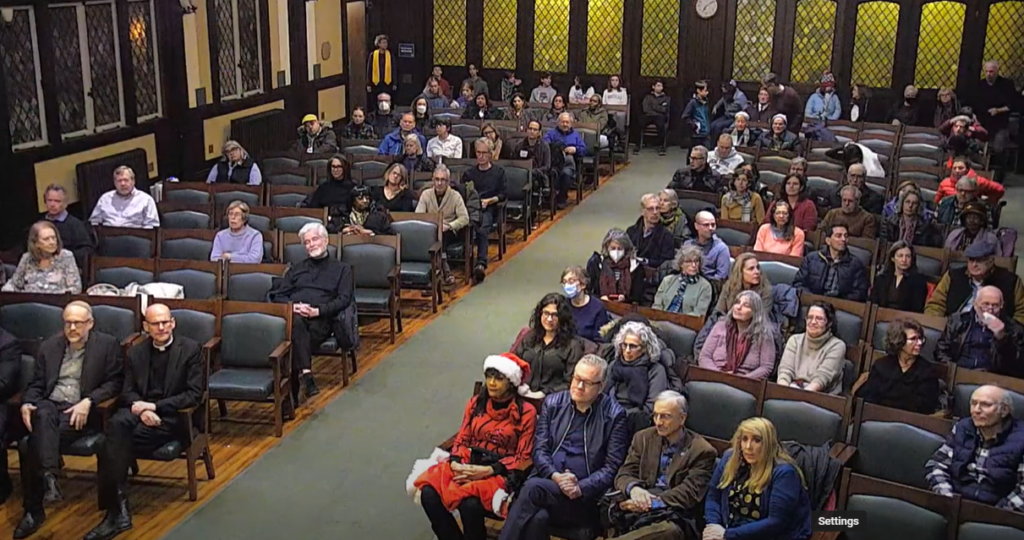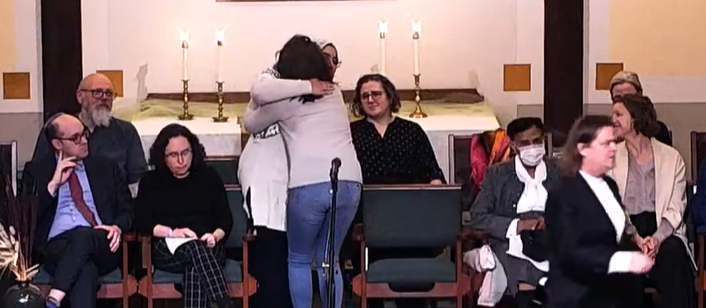The Montclair clergy who organized what they called “A Sacred Space for Lament and Love During a Time of War” feared that their best-laid plans could go awry. After several public disputes in town between Palestinians and Jews, the religious leaders believed that the community badly needed an interfaith gathering—a setting where Muslims and Jews, a Palestinian and an Israeli, could share their truths from the same stage.
But they worried, too, about disruptions. Ariann Weitzman, B’nai Keshet’s rabbi educator and one of the key planners, had trouble sleeping the night before the Nov. 30 event.
“I had a fear that people would say things that would make us angrier at each other, instead of bringing us together,” she said. “We knew people would say things that would not be comfortable for some others to hear. The question was: How do we co-exist with people who have a different idea of what happened and accept their version as true to their own experience while asking them to see us in our own truth?”
Indeed, almost all of those interviewed after the event expressed discomfort with at least some of what they heard – Jews were distressed by a Palestinian speaker who questioned Israel’s right to exist; that same speaker said she heard an anti-Palestinian agenda in the comments of rabbis who spoke about the carnage of Oct. 7.
But no one interrupted any of the speakers. Instead, after each talk, members of the clergy led the audience to repeat responsively, “We see you. We hear you. And we love you.” The estimated 185 people in the sanctuary of the Unitarian Universalist Church all joined in the recitation each time – even when they were uncomfortable with what they’d heard. More than a dozen Shomrei congregants attended the event. Rabbi Julie was one of the speakers, as was Ner Tamid’s Rabbi Marc Katz and B’nai Keshet’s Rabbi-educator Weitzman.
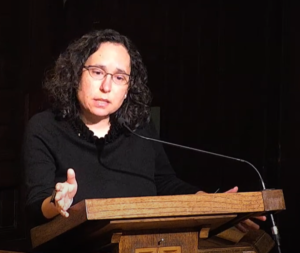 “It’s not easy to be here,” Rabbi Julie said at the start of her presentation. “We wouldn’t be here if there wasn’t love and trust between the clergy. If we weren’t willing to take risks. If we weren’t in pain. If we weren’t willing to try to open our hearts just a little wider to the pain of others.”
“It’s not easy to be here,” Rabbi Julie said at the start of her presentation. “We wouldn’t be here if there wasn’t love and trust between the clergy. If we weren’t willing to take risks. If we weren’t in pain. If we weren’t willing to try to open our hearts just a little wider to the pain of others.”
“I thought it was truly a remarkable evening,” she said afterwards. “We’re living in a time when that is so far from happening.”
“Everyone’s been listening to their own hurt and anxiety and anger,” said Imam Kevin Dawud Amin of Masjid Al-Wadud in Montclair, another speaker. “The intent was just to get into the same room, not to sway anybody. We needed to hear each other.” He said he felt that “the Palestinian Arab side has been dehumanized and people have been desensitized to their humanity.” The event, he said, “contributed to a better atmosphere.”
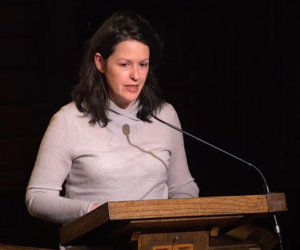 The emotional climax of the program came in an intimate, harrowing account by Yael Birin, an Israeli who was in Tel Aviv with her family during the Oct. 7 attacks. She recounted the terror of sirens and bomb shelters, and the horrific realization that more than 1,200 Israelis were dead, 240 taken hostage, uncounted numbers wounded and women sexually assaulted.
The emotional climax of the program came in an intimate, harrowing account by Yael Birin, an Israeli who was in Tel Aviv with her family during the Oct. 7 attacks. She recounted the terror of sirens and bomb shelters, and the horrific realization that more than 1,200 Israelis were dead, 240 taken hostage, uncounted numbers wounded and women sexually assaulted.
“Time stopped for us that day. It’s still Oct. 7,” she said. The only hope she can salvage, she added, came from families of victims who called on all Israelis to seek peace, not war.
“Families of the murdered, the hostages, the tortured and the burned—they’re indeed in the shadow of death, in agonizing pain. They spoke of seeing the other. Seeing the other. They spoke of it with no fear – as if they had earned the right to be heard no matter what. . . ,” she said. “They placed in front of us the mirror of who we thought we’d be one day. That’s when it became crystal clear to me: Those families are the moral prophets walking ahead of our people. If they can endure and live there in that moral compass, we can all try to as well. . . We can have a future.”
She ended by looking out out at the audience and saying, “I see you,” then turning to the Jewish, Arab and Muslim speakers behind her on the stage and saying again, “I see you.”
Birin, who works for an Israeli software company and has lived in Montclair for ten years, was shaking as she finished and was hugged by three clergy as she made her way to her sea. She was followed to the podium by Rania Mustafa, who heads the Palestinian American Community Centers in Paterson and Clifton. In perhaps the most dramatic moment of the evening, as the two women passed each other, they fell into each other’s arms for a prolonged hug.
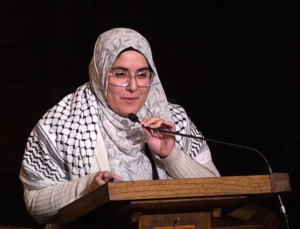 Mustafa, who has many family members on the West Bank, wore a keffiyah and a Muslim head covering. She said she feared she would be spurned for wearing the keffiyah, a symbol of Palestinian nationalism, and that others would not recognize her humanity. “But I decided to take that risk because this is who I am,” she said.
Mustafa, who has many family members on the West Bank, wore a keffiyah and a Muslim head covering. She said she feared she would be spurned for wearing the keffiyah, a symbol of Palestinian nationalism, and that others would not recognize her humanity. “But I decided to take that risk because this is who I am,” she said.
In her view, she said, the conflict was not Jews versus Muslims but rather Israel versus Palestine. She acknowledged that the Oct. 7 attacks were tragic, but she spent most of her talk recounting stories of her West Bank family being harassed by Israeli settlers and soldiers. She said her relatives asked her if the outside world knew of their plights. If so, they wondered, how it was allowed to continue?
After the event, she was asked about the dramatic moment when she and Birin hugged each other. “Of course I hugged her,” she said. “She’s a human being. I’m a human being. I would never want anyone to be as scared and sad as she is. I feel for her. That’s the whole point.”
The audience was almost all Jewish and Christian. There were no Palestinians, according to Mustafa, and Imam Amin said no members of his mosque attended. Mustafa said she felt lonely, as the only Palestinian in a gathering intended to build community between Palestinians and Jews. The clergy-organizers said they saw the meeting as an important first step, adding that they planned a follow-up gathering, in which they will address ways to build a wider community.
Editor’s Note: We’ve been asked not to post the recording but it is available on request. If you would like to watch the recording, please email email hidden; JavaScript is required.
- A Fun Event — and a Great Shomrei Cause - Wed, May 1, 2024
- Seeing the Other - Thu, Dec 14, 2023
- Helping Families Facing Homelessness - Thu, Sep 29, 2022

